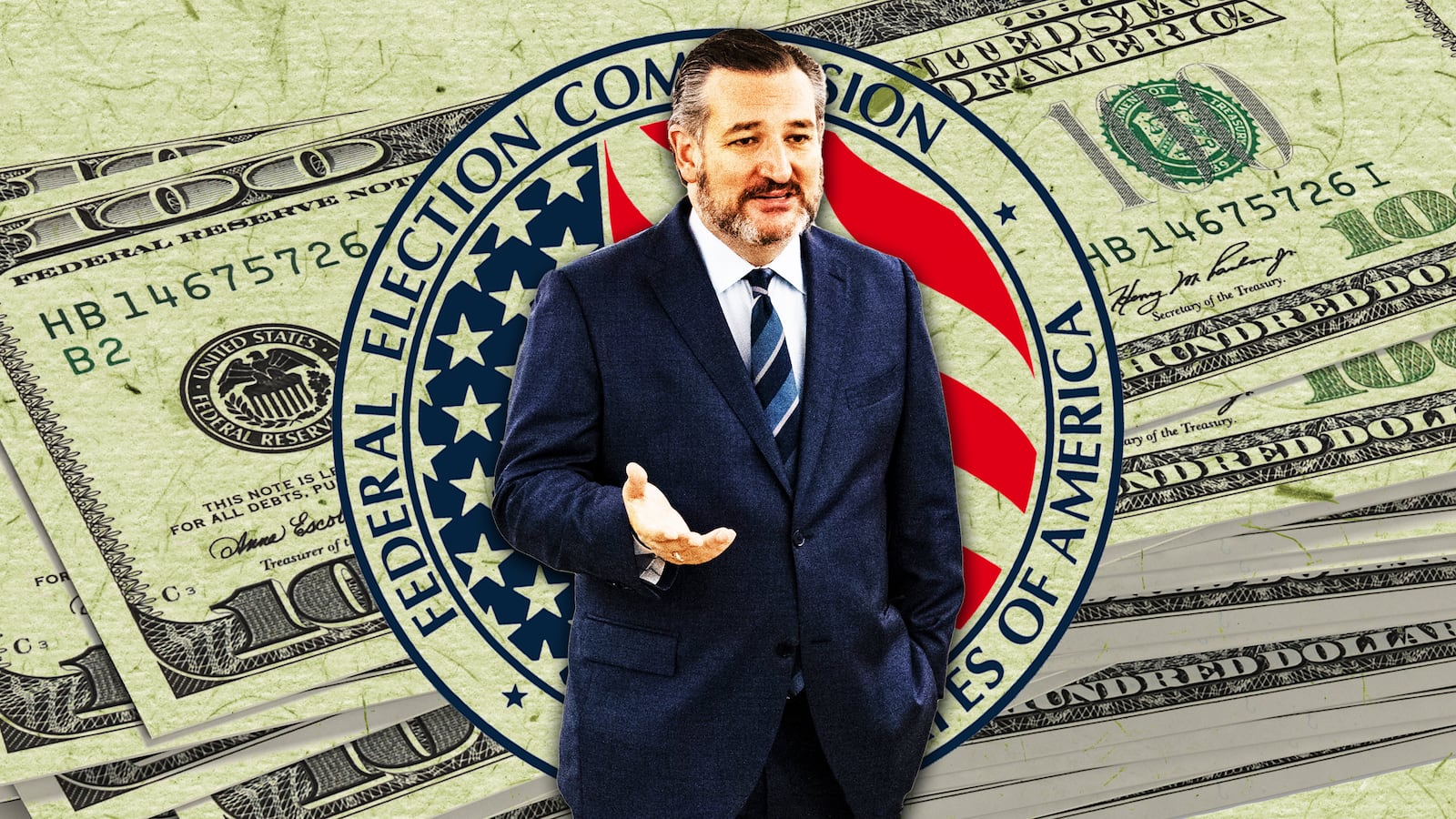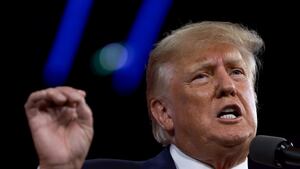Pay Dirt is a weekly foray into the pigpen of political funding. Subscribe here to get it in your inbox every Thursday.
In the pantheon of politicians fighting for unpopular causes, Sen. Ted Cruz (R-TX) has now secured a prominent place.
Like Mitch McConnell pushing for more money in politics, Cruz has also found a niche as an election law troll.
On Monday, Cruz won a lawsuit against the Federal Election Commission that had gone all the way to the Supreme Court. The six conservative justices struck down a federal law that limited the amount of campaign funds candidates can use to repay loans to their campaign.
It wasn’t organic. Cruz had engineered the case during his 2018 campaign against Beto O’Rourke, when on the last day before the election he loaned himself $260,000—a clean $10,000 above the $250,000 repayment cap. The personal loan, coming at the tail end of what was at the time the most expensive Senate race in U.S. history, was entirely unnecessary.
Cruz then sued for the right to recoup that extra $10,000 with money raised more than 20 days after the election, arguing the law infringed on his First Amendment rights. And in its first campaign finance ruling since 2014, the Court agreed.
While Cruz personally didn’t have much on the line, it was a huge win for conservative critics of campaign finance regulation, who have for years sought to shred restrictions imposed after the bipartisan passage of 2002’s McCain-Feingold campaign finance reform act.
Want a closer look inside the pockets of the government’s most powerful players? Subscribe to the Pay Dirt newsletter here for exclusive reporting every Thursday.
But reform advocates, like Campaign Legal Center vice president and legal director Adav Noti, roasted it as an affront to democracy and a “mockery” of law.
“The Supreme Court’s decision in the Cruz case is a victory for rich people and corporations who want to buy influence over elected officials. By letting big donors repay politicians’ personal loans, the Supreme Court has again sided with special interest money over the voters’ right to a fair and transparent campaign system,” Noti told The Daily Beast.
“As the Supreme Court continues to make a mockery of its duty to protect voters’ rights,” he continued, “Congress and the states have an opportunity to step up on behalf of Americans who want their voices heard in government but don’t have thousands of dollars to put in Senator Cruz’s pocket as an entry fee.”
One upshot of the ruling is that it affords further advantage to independently wealthy upstart candidates like Dr. Mehmet Oz, Democratic billionaire Tom Steier, or former Sen. Kelly Loeffler (R-GA), who can now loan their campaigns millions of dollars with less risk—megadonors can help them fully pay themselves back, personally, after the election.
“Political contributions that will line a candidate’s own pockets, given after his election to office, pose a special danger of corruption,” Justice Elena Kagan wrote in her dissent, noting that the winner of an election is “in a position to give something in return.”
Steve Spaulding, senior counsel at good government group Common Cause, said Cruz was the spearhead of a larger ideological campaign.
“It’s another brick along the road of the right wing’s coordinated effort to dismantle laws intended to protect our democracy, including from corruption,” Spaulding told The Daily Beast.
Campaign finance restrictions have chafed Republicans, who historically draw less from small-dollar contributors than Democrats and instead lean heavily on lump sums from wealthy megadonors.
The GOP has also leaned—reliably—on the Supreme Court, whose dominant conservative wing has taken a critical view of campaign finance regulations. This ideology manifested most famously in 2010’s Citizens United decision, which paved the way for super PACs and unlimited, untraceable political spending. But a 2014 ruling—McCutcheon v. FEC—opened up new channels to wash massive amounts of megadonor cash between campaigns, candidates, and national and state party committees. Or, as Spaulding put it, “the ruling that blew the doors off how much money individuals could contribute to parties.”
Cruz, an anti-regulation hawk, has been a thorn in the FEC’s side for years.
He has flouted fundraising caps, disclosure laws and restrictions on self-enrichment, zombie campaigns, and personal security. Most recently, he has seemingly sidestepped rules governing candidate coordination with super PACs. But along the way, Cruz also may have crossed legal lines, drawing a civil complaint last year after The Daily Beast reported that his campaign appeared to have misused campaign funds to promote—and profit from—his own book.
“Ted Cruz is perhaps the most cynical member of the Senate when it comes to this issue, perhaps only bested by Mitch McConnell,” Spaulding said. He recalled an interaction with Cruz at a 2015 Senate hearing about dark money in elections.
“Cruz came down afterwards, and actually tried to pitch me on his idea of eliminating super PACs by allowing unlimited contributions directly to candidates. He was giving that argument with a straight face,” Spaulding said. “The guy is so blatantly cynical and dangerous, but all of this really just shows you where he comes from on these issues.”
However, with the rise of super PACs, which can raise and spend unlimited amounts of money, including from corporations and dark money groups, individual campaigns have over time lost influence.
But never fear, because Cruz has you covered there, too.
Earlier this year, The Daily Beast reported that Cruz had begun using his campaign account like a super PAC, shelling out independent expenditures to support a former staffer running for Congress in Texas and blurring the lines of unlawful coordination. Now it appears the Cruz camp is arming a new super PAC of its own.
The group, called “Truth and Courage PAC,” quietly emerged in Dec. 2021, and immediately began throwing fundraising bashes in Cruz’s home state of Texas. To date, the super PAC has amassed $2.8 million, but so far hasn’t contributed money towards an election, so it hasn’t shown any cards about its allegiances.
The Daily Beast’s analysis of campaign finance disclosures, however, found a remarkable overlap between this super PAC and Cruz world, on both the raising and spending sides.
Some of the group’s first donations, $50,000 a piece, came from an LLC based in Hackensack, New Jersey. But those companies actually operate senior homes in St. Louis, Missouri—and poorly rated ones at that.
The owner, Ben Klein, is a Cruz supporter who in 2015 settled a federal lawsuit over allegations that his senior homes had defrauded at least $1 million from Medicaid.
Another major Cruz donor, billionaire and Cato Institute mainstay Jeff Yass, contributed $1 million to Truth and Courage. And the group took in a $250,000 gift from a revocable trust belonging to Michael Adams—who is, yes, a big time Cruz backer. Thomas Rastin and Karen Wright, also Cruz benefactors, gave $50,000 apiece.
It goes on.
On the spending side, the super PAC—which shares initials with the senator—has retained the Gober Group for legal services. That’s the same law firm that represented Cruz in the Supreme Court case.
In March, the super PAC paid $20,000 to consulting firm J2 Strategies, run by former Cruz for President strategist Jason Johnson. Lofstrom Consulting—a Cruz go-to run by the finance director from that same presidential campaign—has pulled about $100,000. Truth and Courage has also paid Cruz-y Rightside Compliance, his longtime strategist Jeff Roe, as well as staffer Kayla Ashman.
Some common vendors are quite specific. There’s River Ranch Stockyards, a Texas venue where Cruz held a 2021 “Back the Blue” fundraising event. And Ruth’s Chris Steakhouse, an old Cruz haunt.
The super PAC also doled out about $1,600 to a North Carolina-based apparel company called “Bald Head Blues,” which only two other committees have ever paid—with the larger of those two checks coming from the Cruz 20 for 20 Victory Fund.
As a cherry on top, Truth and Courage and all of Cruz’s active committees use the same bank—Truist. While that usually wouldn’t be notable at all, none of the Cruz committees previously used the bank, but all of them opened Truist accounts in 2022.
Subscribe to the Pay Dirt newsletter here to follow the movement of the dirty dollars influencing our public policy.











